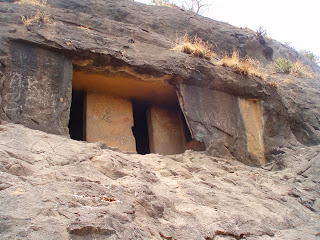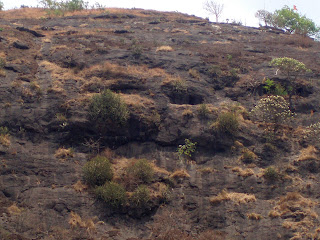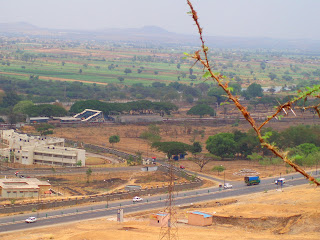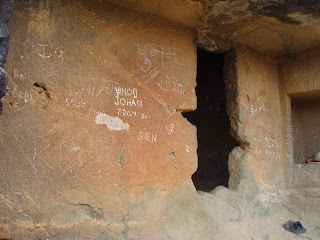Ghorwadeshwar are ancient Buddhist caves built around 3-4th century , that have over the years given way to temples dedicated to Ghorawadeshwar viz.Lord Shiva and the temple of Vithoba ,Rakhumai .
It is believed that the saint Tukaram used to meditate at these caves, due to their proximity to his birthplace,Dehu, near Pune.
The caves are located on a hill near the village Shelarwadi, at Dehu, which is on Old Mumbai Pune highway.
At the entrance (base of the hill) one comes across an newly constructed arch, with a statue of Nandi (Shivas bull / vehicle) and a tortoise figurine representing one of Lord Vishnus dashavatars.
After this arch there are several stone steps one has to climb. Midway the steps end and the road is rough and stony , but treadable.
After about a twenty minute climb, one walks over the planes. From here the caves are easily visible.
As one gazes down, we also get a panoramic view of the highway below and the villages of Dehu,Talegaon etc.
The first cave one encounters is the Vithoba Rakhumai temple. Incidently besides the statues of these deities is a third statue which one presumes belongs to the saint Tukaram.
As one comes out of the cave and moves left, we see a group of caves.
Most happen to be abandoned Viharas / resting places for the monks ,
while the main cave which once was a Chaityagriha (the main Buddhist meditation room) and housed a Stupa (a place where Buddhist holy relics are kept) , but has since made way for the main Ghorawadeshwar temple.
In the cave one sees is a Shiva linga (phallic representation of Lord Shiva) . Alongside one can see a trident (Shivas weapon) .
There is also a Nandi statue facing the Shiva linga, which one sees immediately after entering through a arched doorway.
On the wall one can also see an inscription in Brahmi (an ancient script) which states that the Chaityagriha is dedicated with affection by Buddha and Sangha, the daugters of Dhatapar who was a disciple of Bhadantsingh.
The caves also accommodate several minor temples and figurines of deities, besides some water cisterns.
Text and Photographs : Abhijit Rajadhyaksha


















No comments:
Post a Comment